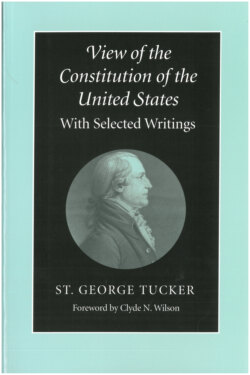View of the Constitution of the United States

Реклама. ООО «ЛитРес», ИНН: 7719571260.
Оглавление
St. George Tucker. View of the Constitution of the United States
Отрывок из книги
View of the Constitution of the United States
Foreword
.....
An aristocracy is that form of government in which the supreme power is vested in a small number of persons. It may be absolute, or limited; absolute, where it is not founded in the consent and compact of the society, over which the government is established; or limited, where that consent has been given, and the constitution and its powers have been fixed, and limited, at the time of such consent; but in which the other important characters of a representative democracy have not been preserved. It may likewise be temporary; as where the members of the supreme council, or senate sit there only for a certain term and then retire to their former condition; or perpetual, during their lives. It may likewise be hereditary; where the representatives of certain families (distinguished by the flattering epithet of the well-born,) are senators by birth, or elective, where either at certain periods the whole senate is chosen, and vacancies are supplied by election. And this election may be either popular as where the body of the people choose the person whom they may think proper to advance to the senatorial dignity; which is also called creation, where the person so chosen is advanced from the plebeian to the senatorial order: or it may be made by the whole senatorial order, from among themselves; or by the senate itself, out of the members of the senatorial order in which case it has been styled co-optation: or by the senate itself out of the order of plebeians; in which case as in one before mentioned, it obtains the name of creation.
This form of government is capable of such an approximation, and resemblance, in its external form, to a representative democracy that the one is frequently mistaken for the other. The discriminating features of a representative democracy, as we have before observed, are the limitation of power; the frequency of elections, by the whole body of the people; the capacity of every citizen of the state to be elected to any public office, to which his talents and integrity may recommend him; and the responsibility of the public agent to the people, for his conduct. If all, or either of these characters be wanting in the constitution of the state, it is an aristocracy, though it should be founded upon the consent of the people, if either of these characters be wanting in the mode of administering the government, it then becomes an aristocracy founded upon fraud and usurpation. Seldom has such a government failed to spring up, from the immediate ruins of monarchy: never, perhaps, has it hitherto failed to undermine and subvert a government founded on the principles of a democracy. There is not in nature a spirit more subtle than aristocracy; nothing more unconfinable; nothing whose operations are more constant, more imperceptible, or more certain of success; nothing less apt to alarm in infancy; nothing more terrible at maturity.
.....